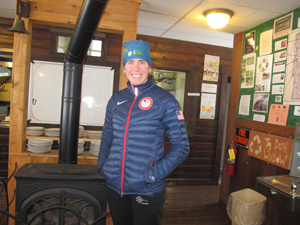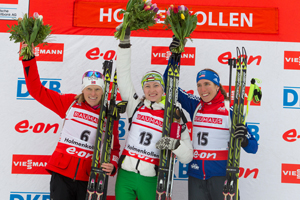

copyright the Chronicle April 2, 2014
by Natalie Hormilla
CRAFTSBURY — Susan Dunklee of Barton returned to Vermont last week, having made history once again.
After her Olympic run in Sochi, Russia, in February, it was back to business as usual on the biathlon World Cup circuit. In her final week of races, in Oslo, Norway, Ms. Dunklee had a career breakthrough: She came in third in the 7.5-kilometer sprint, marking the first time in 20 years that an American woman biathlete graced the World Cup podium.
“Just to get up there, when it’s the same field, it’s pretty special,” she said in an interview last week. She was referring to the wide field of athletes that participate in World Cup races.
World Cup races can be more competitive than Olympic races, Ms. Dunklee said, because top-performing countries that send athletes to the World Cups don’t always send those competitors to the Olympics, for a variety of reasons. She mentioned that Sweden had a good women’s team, but didn’t send it to the Olympics.
Her final World Cup week ended on a high note. After her historic win, she placed sixth in another race, which she said was her fourth best result ever, and she placed eighteenth in her very last race of the season.
“It was a good week,” Ms. Dunklee said, in an interview at the Craftsbury Outdoor Center, where she is sort of an athlete in residence with the Green Racing Project.
Most people don’t have their job performance so quantified, but Ms. Dunklee seems to keep a cool head.
“You can’t be obsessed with the results,” she said. “You have to be focused on the process.”
She sounded equally cool about her budding Olympic career.
“The Olympics, in a lot of ways, is the same sort of routine as the World Cups,” she said. “But it gets a lot more attention.”
After some thought, she added, “You don’t quite get that goosebumps feeling when you’re on the start line for the World Cups.”

If Ms. Dunklee sounds practiced, it’s because she is. At 28, she just completed her fourth season of World Cup racing. Before that, she competed in a racing circuit with the International Biathlon Union (IBU), which she started doing in 2008. That was also the year she graduated from Dartmouth College, where she was a dual sport athlete, competing on the cross-country running team and the ski team.
Her time with the IBU marked the addition of a firearm to her sport, taking her from just cross-country ski racing to racing while periodically stopping to shoot a .22-caliber rifle, sometimes standing and sometimes lying down, in the sport known as biathlon.
It’s fair to say that biathlon found Ms. Dunklee, and not the other way around.
“I got an e-mail my senior spring of college,” she said. The U.S. Biathlon Team was recruiting top college skiers who might be interested in a change of sport. Would Ms. Dunklee be interested?
“They had housing and food available at Lake Placid,” in New York, where the national team trains, she said.
She accepted the offer. At that point, she had never even shot a gun before.
These days, she can tell you all about the rifle used in biathlon.
The .22 is highly precise and doesn’t kick much, she said. Most importantly for biathlon, “you can do the whole process of shooting without breaking position,” she said. “It’s just a flick of the wrist.” She mimed this last maneuver, of being perfectly still while shooting an imaginary gun propped against her shoulder in the cafeteria of the Outdoor Center.
Ms. Dunklee said she is passionate about biathlon. That’s apparent.
“It’s got all the components that I love about skiing, but then the mental component of shooting. It takes a tremendous amount of emotional strength” to shoot in biathlon, she said. “The essence of the sport is the ability to switch between the go-go-go of ski racing and the Zen-like ability to shoot well.”
“The challenge in shooting is to avoid thinking. Things should be as automatic as possible. You want everything to be the same every time,” she said. “You want your breathing to be the same. You want your timing to pull the trigger to be the same.”
Her shooting rhythm goes like this: inhale, exhale, shoot; inhale, exhale, shoot. You always shoot after you exhale, when the body is most still, she said.
Biathletes shoot five shots to hit five targets in every shooting round in a race. It’s hard if you’ve gotten, say, four of your five shots, to not think, I only need one more to be clean! right before you pull that trigger for the fifth time, she said.
That scenario played out for Ms. Dunklee at her first Olympic race, the women’s 7.5-kilometer sprint, on February 9. She missed her final shot out of ten, which pushed her down to fourteenth place. Had she made that tenth shot, she would have had a real chance at a medal, which would have been a first for all American biathletes, male or female. She finished the race fewer than 20 seconds behind the bronze medalist, but the penalty lap that she skied for missing that final shot made catching up impossible. Still, her performance that day was a personal, and national, best. It was the best ever sprint finish for a female American biathlete.
“It doesn’t take much, it’s such a small thing” to miss a shot, she said. “You’re playing these mental games with yourself all the time.”
You can miss a shot and have no idea why, she said. “You can feel like you did everything exactly the same.”
These days, Ms. Dunklee also shoots a shotgun. She picked up turkey hunting three or four years ago from her teammates from Colorado.
She credits aspects of her upbringing with at least some of her career success. Growing up, she logged plenty of hours on cross-country skis, racing alongside her hometown friend Ida Sargent, who also competed in her first Olympics this year, in cross-country skiing. The two girls spent many years skiing in and around the Craftsbury Outdoor Center before turning professional.
“Part of the reason we’re doing so well is because Ida and Elsa and I raced each other every Sunday,” she said, referring to Ms. Sargent and her older sister, Elsa.
The girls all competed in the Bill Koch League.
“We were very competitive. We also had a lot of fun.”
As kids, they would leave school in Barton to go to the Glover school every Friday for even more skiing.
“They had enough skis for any kids who showed up,” Ms. Dunklee said. “A lot of times we built jumps. That’s how you get good.”
Her father, Stan, is also an Olympian. He cross-country skied for the U.S. in both the 1976 and 1980 games. Ms. Dunklee said that her father also came up in “a little bubble of talent,” as she did. Mr. Dunklee skied on the same Olympic team as the legendary Vermonter Bill Koch, who is still the only American to win an Olympic medal in cross-country skiing.
Right now, Ms. Dunklee is trying to figure out her spring schedule until she resumes training with the national biathlon team late this month.
This past weekend, she taught a biathlon clinic at the Outdoor Center for kids up through eighth grade, alongside fellow Olympian Hannah Dreissigacker of Morrisville, whose parents purchased the Outdoor Center in 2008.
After that, it’s off to the White House with the entire U.S. Olympic Team. Ms. Dunklee wasn’t entirely certain of what would happen there.
“I think we get to meet Obama,” she said.
After that, she might take a trip, and she might not. She also hopes to take up beekeeping.
“Right now my biggest project is what to get for a car.”
Once the summer training session kicks in, she’ll be very busy. She travels between the Craftsbury Outdoor Center and Lake Placid all summer and maintains a full-time schedule as an athlete.
“To be competitive at the international level now, you really do have to make it a full-time job.”
“That’s why this place is so great — the Dreissigackers really understand what it takes.”
Both of Ms. Dreissigackers parents, Dick Dreissigacker and Judy Geer, are Olympians, too.
In summer, Ms. Dunklee trains around 25 hours per week, not counting recovery time, which is just as important as the training, she said. After a full day of training, you need a few hours of recovery so your body can really benefit, she said.
“It’s a lifestyle. Sometimes you don’t go out with your friends because you have a hard training the next day.”
Her training includes more than just skiing and shooting. She bikes, roller skies, runs, rows, swims, and hikes, all in an effort to build up endurance.
So what does a person who’s skiing four or five hours at a time think about to pass the time?
“You think about just about anything,” she said. “I’ve composed letters to people in my head, thought about gardening projects, philosophy….”
In competition, her mental state is totally different.
“In a race I’m very focused on the people around me, like if I sprint around this corner, will I be able to drop this girl? Or, what line do I want to take? Little details. It’s all about the little details.”
She will spend part of her time this summer working on the gardens at the Outdoor Center. She also started a community plot at a garden in Lake Placid. Her college major was ecology.
Ms. Dunklee defies any stereotypes of an athlete with a one-track mind.
“It was hard when I decided to take up biathlon at that level, because I have a lot of interests,” she said. She second-guessed herself a lot.
What would she be doing otherwise? “I’d probably be doing field research,” she said.
“When I finish with biathlon, I’ll find something interesting to do. This isn’t the easiest lifestyle to live long term.”
Her summer training season comes to an end in November, when she resumes her World Cup schedule through March. She spends all that time traveling through Europe and Russia, changing hotel rooms pretty much weekly. She returns home for ten to 14 days over Christmas.
“You’ve got to have hobbies to entertain yourself in a hotel room,” she said. “I try to learn guitar, but I’m not very good at it.” She also reads a lot, mostly fiction.
There can be a lot of crowd pressure on the European biathlon circuit. The sport is relatively little known in the U.S. compared to some other places.
“In Germany, they’ll have five million people tuned in for a biathlon World Cup, prime time. If you have, say, a German biathlete shooting right next to you, if they hit their target, you have 30,000 people, who are right behind you, cheering — or booing if they miss. My friend said, that’s 60,000 eyes watching you.”
Her European opponents are famous. “They’re super stars, they get mobbed for autographs,” she said. She’s glad that life isn’t like that for her here at home.
Americans will have a chance to watch Ms. Dunklee and her teammates in action on home soil in 2016, when the World Cups will make a stop in Presque Isle, Maine.
Part of what makes the sport so popular with spectators is the possibility for anyone to come out on top.
“It’s such an unpredictable sport, results wise, because it combines such different disciplines.”
About 20 different people shared the podium at the World Cups this season, she said.
“It can be anybody’s day.”
contact Natalie Hormilla at [email protected]
For more free stories like this one, please see our Sports page.







